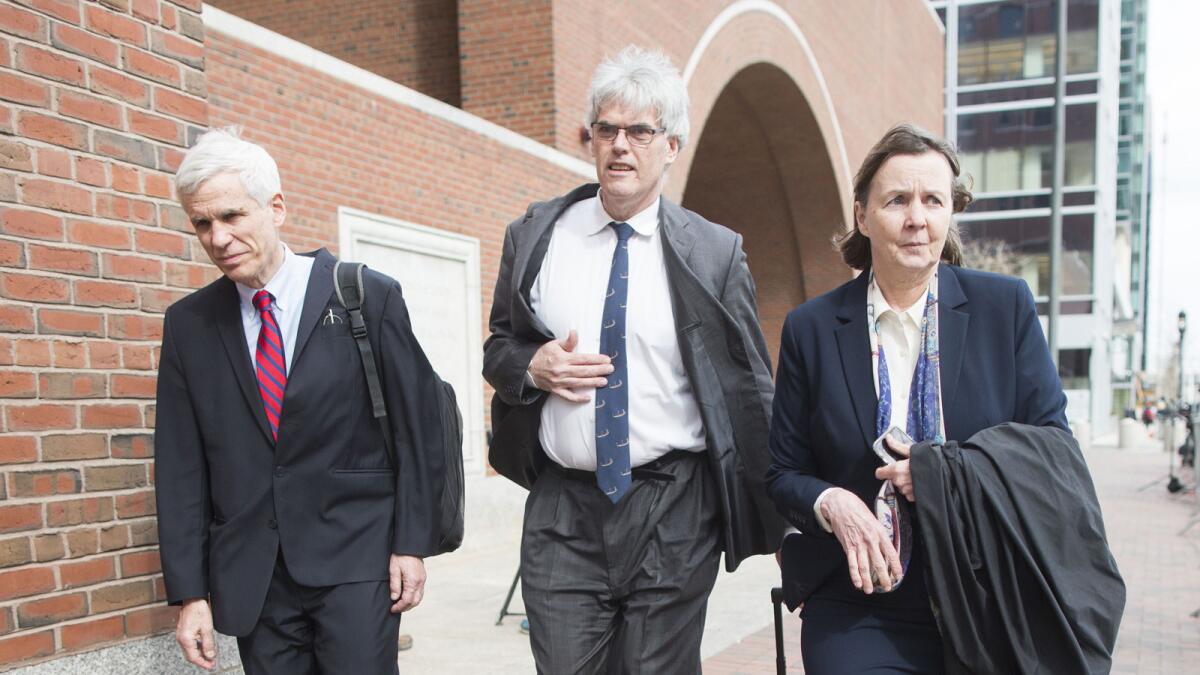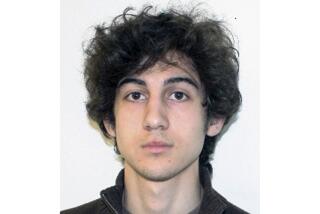Boston Marathon bomber’s defense lawyers say older brother controlled him

- Share via
Reporting from Boston — Defense lawyers in the Boston Marathon bombing trial used flickering scenes from a surveillance video Tuesday to help capture the troubled relationship between Dzhokhar Tsarnaev and his older brother, Tamerlan.
Filmed three days before the brothers’ bombs killed three people and injured more than 260 on April 15, 2013, the video was shown to the jury in Dzhokhar’s capital murder trial.
The video was from the Wai Kru gym in suburban Boston. Tamerlan Tsarnaev was warming up in a boxing ring when he suddenly jumped over the ropes to get something in the gym.
He then approached his brother, who was slouched in a chair, and threw a pair of hand wraps -- the bandage-like cloth boxers use to protect their hands before putting on gloves -- at his face. Dzhokhar Tsarnaev meekly picked them up.
His legal team showed the video to support their argument that Tamerlan controlled and intimidated Dzhokhar, who was seven years younger. Fear of Tamerlan, the defense maintains, is why Dzhokhar helped his brother carry out a terrorist attack.
Tamerlan was killed in a police manhunt after the bombings. Dzhokhar was convicted this month of 30 criminal charges, including 17 that carry a potential death penalty. The jury now must decide whether he should be sentenced to death or life in prison without parole.
John Curran, Tamerlan’s boxing coach, told the jury that Dzhokar “was like a puppy following his brother.”
Sam Lipson, whose family rented an apartment to the Tsarnaev family, said the difference between the brothers was striking.
Dzhokhar as a child, he said, was “very sweet, a little shy around adults. He would smile.”
Tamerlan, he said, “was very strong, he was more mature. He dressed nicely, in sort of more Euro-style clothing. He was smooth, kind of slick.”
The defense also read aloud from FBI reports, made after the bombing, that quote Tamerlan’s friend, Magomed Dolakov. He told agents that Tamerlan was a radicalized Islamic fundamentalist “not open to anyone else’s beliefs,” and that he had wanted “to join the mujahadeen.”
Dzhokhar, Dolakov told the FBI, “was always very quiet and just listened rather than saying very much.”
Tamerlan, a Russian immigrant, was a promising boxer in the Boston area.
Defense witnesses said he unraveled when the USA Boxing organization in 2010 disqualified him from the Golden Gloves finals because he was not a U.S. citizen.
Curran said Tamerlan asked him to “fix things” so he could box again. “He thought I could pull a rabbit out of the hat and make it possible for him to go,” Curran said. “I saw him maybe two times after that.”
Brandon Douglas, who helped run the Wai Kru gym, said Tamerlan believed the disqualification “was an intentional slight directed solely at him.”
His behavior soon changed radically. Once given to flashy clothes and alligator shoes, he now grew a bushy beard and was abusive to others.
He used other men’s equipment at the gym without asking. “He could be loud and disruptive,” Douglas said.
“Most of the time he was drunk,” Rogerio Franca, a Brazilian immigrant who spoke through a translator in court, said of his friend Tamerlan. “Most of the time he was high. It was all drugs and alcohol.”
The defense lawyers said Tamerlan initially planned a terrorist attack when he made a six-month trip to the Russian republic of Dagestan and to Russia in 2012. They said he came back to Boston because he could not find a “holy war” to join there.
Back home, he went online to find pictures of dead children from Middle East massacre sites. He downloaded videos of militants tramping through the woods. He posted pictures of himself dressed in traditional Arab garb, wrapped in a flag and brandishing a large black handgun.
His wife, Katherine, adopted his strict Islamic faith, gave up Western clothing for more conservative styles and used the name Karima. She too searched the Web, the defense lawyers said.
“If your husband becomes a martyr,” she asked on the Internet, “what are the rewards for you?”
More to Read
Sign up for Essential California
The most important California stories and recommendations in your inbox every morning.
You may occasionally receive promotional content from the Los Angeles Times.













